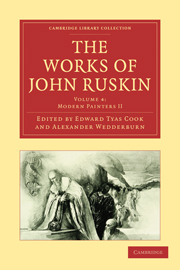Book contents
- Frontmatter
- Contents
- LIST OF ILLUSTRATIONS
- INTRODUCTION TO THIS VOLUME
- BIBLIOGRAPHICAL NOTE
- MODERN PAINTERS
- AUTHOR'S PREFACE TO THE RE-ARRANGED EDITION (1883)
- AUTHOR'S SYNOPSIS OF CONTENTS
- PART III OF IDEAS OF BEAUTY
- SECTION I OF THE THEORETIC FACULTY
- CHAPTER I OF THE RANK AND RELATIONS OF THE THEORETIC FACULTY
- CHAPTER II OF THE THEORETIC FACULTY AS CONCERNED WITH PLEASURES OF SENSE
- CHAPTER III OF ACCURACY AND INACCURACY IN IMPRESSIONS OF SENSE
- CHAPTER IV OF FALSE OPINIONS HELD CONCERNING BEAUTY
- CHAPTER V OF TYPICAL BEAUTY:–FIRST, OF INFINITY, OR THE TYPE OF DIVINE INCOMPREHENSIBILITY
- CHAPTER VI OF UNITY, OR THE TYPE OF THE DIVINE COMPREHENSIVENESS
- CHAPTER VII OF REPOSE, OR THE TYPE OF DIVINE PERMANENCE
- CHAPTER VIII OF SYMMETRY, OR THE TYPE OF DIVINE JUSTICE
- CHAPTER IX OF PURITY, OR THE TYPE OF DIVINE ENERGY
- CHAPTER X OF MODERATION, OR THE TYPE OF GOVERNMENT BY LAW
- CHAPTER XI GENERAL INFERENCES RESPECTING TYPICAL BEAUTY
- CHAPTER XII OF VITAL BEAUTY. I. OF RELATIVE VITAL BEAUTY
- CHAPTER XIII II. OF GENERIC VITAL BEAUTY
- CHAPTER XIV III. OF VITAL BEAUTY IN MAN
- CHAPTER XV GENERAL CONCLUSIONS RESPECTING THE THEORETIC FACULTY
- SECTION II OF THE IMAGINATIVE FACULTY
- APPENDIX
- Plate section
CHAPTER II - OF THE THEORETIC FACULTY AS CONCERNED WITH PLEASURES OF SENSE
Published online by Cambridge University Press: 05 September 2013
- Frontmatter
- Contents
- LIST OF ILLUSTRATIONS
- INTRODUCTION TO THIS VOLUME
- BIBLIOGRAPHICAL NOTE
- MODERN PAINTERS
- AUTHOR'S PREFACE TO THE RE-ARRANGED EDITION (1883)
- AUTHOR'S SYNOPSIS OF CONTENTS
- PART III OF IDEAS OF BEAUTY
- SECTION I OF THE THEORETIC FACULTY
- CHAPTER I OF THE RANK AND RELATIONS OF THE THEORETIC FACULTY
- CHAPTER II OF THE THEORETIC FACULTY AS CONCERNED WITH PLEASURES OF SENSE
- CHAPTER III OF ACCURACY AND INACCURACY IN IMPRESSIONS OF SENSE
- CHAPTER IV OF FALSE OPINIONS HELD CONCERNING BEAUTY
- CHAPTER V OF TYPICAL BEAUTY:–FIRST, OF INFINITY, OR THE TYPE OF DIVINE INCOMPREHENSIBILITY
- CHAPTER VI OF UNITY, OR THE TYPE OF THE DIVINE COMPREHENSIVENESS
- CHAPTER VII OF REPOSE, OR THE TYPE OF DIVINE PERMANENCE
- CHAPTER VIII OF SYMMETRY, OR THE TYPE OF DIVINE JUSTICE
- CHAPTER IX OF PURITY, OR THE TYPE OF DIVINE ENERGY
- CHAPTER X OF MODERATION, OR THE TYPE OF GOVERNMENT BY LAW
- CHAPTER XI GENERAL INFERENCES RESPECTING TYPICAL BEAUTY
- CHAPTER XII OF VITAL BEAUTY. I. OF RELATIVE VITAL BEAUTY
- CHAPTER XIII II. OF GENERIC VITAL BEAUTY
- CHAPTER XIV III. OF VITAL BEAUTY IN MAN
- CHAPTER XV GENERAL CONCLUSIONS RESPECTING THE THEORETIC FACULTY
- SECTION II OF THE IMAGINATIVE FACULTY
- APPENDIX
- Plate section
Summary
Explanation of the term “Theoretic”
I proceed, therefore, first to examine the nature of what I have called the Theoretic faculty, and to justify my substitution of the term “Theoretic” for “Æsthetic,” which is the one commonly now employed with reference to it.
Now the term “æsthesis” properly signifies mere sensual perception of the outward qualities and necessary effects of bodies; in which sense only, if we would arrive at any accurate conclusions on this difficult subject, it should always be used. But I wholly deny that the impressions of beauty are in any way sensual; they are neither sensual nor intellectual, but moral: and for the faculty receiving them, whose difference from mere perception I shall immediately endeavour to explain, no term can be more accurate or convenient than that employed by the Greeks, “Theoretic,” which I pray permission, therefore, always to use, and to call the operation of the faculty itself, Theoria.
Of the differences of rank in Pleasures of Sense
Let us begin at the lowest point, and observe, first, what differences of dignity may exist between different kinds of æsthetic or sensual pleasure, properly so called.
Now it is evident that the being common to brutes, or peculiar to man, can alone be no rational test of inferiority or dignity in pleasures.
- Type
- Chapter
- Information
- The Works of John Ruskin , pp. 42 - 50Publisher: Cambridge University PressPrint publication year: 2010First published in: 1903



